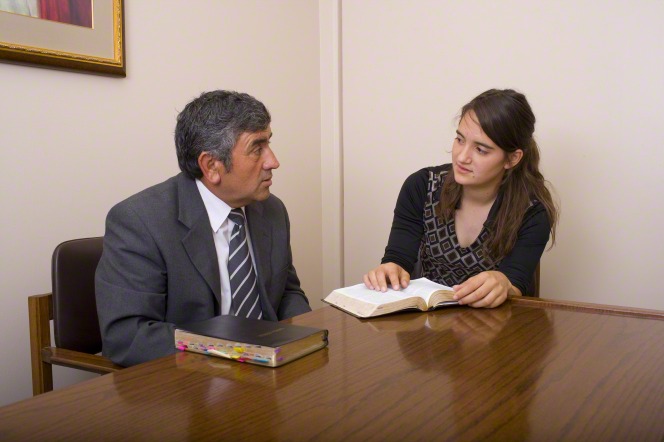Every so often, a situation arises where Brigham Young University and its Honor Code come under scrutiny by the news media. Regardless of the latest news story or issue that pops up, the questions that many people have are just what is the Honor Code at BYU and why are violations of it such a big deal? It all boils down to one word: integrity. BYU President Kevin J Worthen said:
Having signed the Honor Code, compliance is not a question of fashion or personal expression. It is a question of integrity, which, as President [Spencer W.] Kimball said, “is one of the foundation stones of good character.” [“Building Character,” BYU Speeches, Sept. 8, 2015.]
The bottom line is that every student who attends BYU promises to abide by the Honor Code. But the truth is, you can’t fully appreciate the Honor Code without understanding what Brigham Young University is all about . Elder Neil L. Andersen said,
BYU is a very special place. The Lord’s influence is upon this school. For a young man or woman desiring a university education, it is an oasis of righteousness. For a young disciple of Christ, BYU offers an extraordinary environment for learning, for meeting others, for making important decisions, and for growing spiritually. [“Honesty—the Heart of Spirituality,” BYU Speeches, Sept. 13, 2011.]
The Honor Code is more than just a standard of behavior and dress, it also helps to set the tone for the school and helps to define what, exactly, a BYU education is.
The Aims of a BYU Education
So what, exactly, is a BYU education? Well, let’s start by talking about BYU itself. Brigham Young University is a school founded by the Mormon Prophet Brigham Young after the Latter-day Saints moved to Utah in the mid-1800s. Education was so important to the Latter-day Saints that even as they were building their settlements they were building schools as well. Brigham Young donated a building for a school in 1875, which was named Brigham Young Academy. Mormon scholars Eliot A. Butler and Neal E. Lambert wrote:
The school began with twenty-nine pupils in the elementary program and one teacher, Karl Maeser. In the words of Ernest L. Wilkinson, seventh president of BYU, The school was born in poverty, nurtured in conflict, orphaned by the death of Brigham Young,…left homeless when its uninsured building was completely destroyed by fire, threatened with faculty and administrative resignations because of irregular or missed salary payments, and nearly abandoned on many occasions because of lack of funds…. [At first the academy] was a private school without a sponsor or means of support…. It survived only because of the financial sacrifices made by its faculty and Board of Trustees and voluntary gifts from its friends and from The Church of Jesus Christ of Latter-day Saints. [Finally, after 21 years of struggling existence,] the school was incorporated as an educational subsidiary of the LDS Church, which assumed responsibility for its survival.
The name of the school was changed to Brigham Young University in 1903. The university has grown into a well-known, first class educational institution. Lambert and Eliot wrote:
BYU functions under the direction of the Church through a board of trustees that includes the First Presidency, the general presidents of the women’s auxiliary organizations, and selected General Authorities. The university operates on a budget provided by the Church, one-third of which is derived from student tuition.
BYU’s operating budget is heavily subsidized by The Church of Jesus Christ—and the monies come from the tithing funds of LDS Church members. This is just one thing that sets BYU apart. Brad W. Farnsworth, at the time the administrative vice president of BYU, said,
Sacred tithing funds given by faithful members of the Church are used to support the operation of this university. I believe this … is one of the reasons why this campus is holy ground as we consecrate our efforts to your education and preparation for life after graduation. …
Although the amount of tithing funds appropriated to the university is significant, it’s not as important for us to know the amount of such appropriations as it is for us to follow President [Gordon B.] Hinckley’s counsel and receive these funds with “a deep sense of gratitude and appreciation.” [“Reflections on the BYU Experience,” BYU Speeches, Feb. 8, 2005.]
And Brian Evans, at the time CFO and administrative vice president of BYU, said:
… You are a peculiar people. In fact, your education is deemed so important that the board of trustees has determined that the vast majority of the funds necessary to maintain BYU and provide you with a degree should come from the tithing funds of the Church. You are, in effect, all on scholarship. Such a funding decision is not inconsequential, as these resources could otherwise be put to use to bless the lives of Church members throughout the world, including many living in relative poverty. Such a unique arrangement implies a contract of sorts between the university and its students. After all, the scriptures teach that “unto whom much is given much is required.” [“Your Contract with BYU,” BYU Speeches, Oct. 16, 2007.]
President Gordon B. Hinckley said,
This institution is unique. It is remarkable. It is a continuing experiment on a great premise that a large and complex university can be first class academically while nurturing an environment of faith in God and the practice of Christian principles. You are testing whether academic excellence and belief in the Divine can walk hand in hand. And the wonderful thing is that you are succeeding in showing that this is possible—not only that it is possible, but that it is desirable, and that the products of this effort show in your lives qualities not otherwise attainable. [“Trust and Accountability,” BYU Devotionals, October 2, 1992.]
The goals of a BYU education reflect its history and the faith of those who laid the groundwork for it. As President Worthen explained,
The Aims of a BYU Education document sets forth four specific desired outcomes of your educational experience: “A BYU education should be (1) spiritually strengthening, (2) intellectually enlarging, and (3) character building, leading to (4) lifelong learning and service.”
BYU offers an excellent education in a spiritually rich atmosphere. Those who attend walk on sacred ground consecrated by the sacrifices of many others—both past and present. The Honor Code not only establishes standards of conduct that enrich this environment of faith in many ways but is also a teaching tool for those who adhere to it.
The Honor Code at BYU
The Honor Code is a standard of behavior and dress that is required at all educational institutions owned and operated by The Church of Jesus Christ of Latter-day Saints. It is, in short, a personal commitment to live according to the principles, doctrines and beliefs of The Church of Jesus Christ in daily life both on campus and off. It applies to all faculty, staff and students—even those who are not Mormons.
The Honor Code at BYU has a unique history. President Hinckley explained:
… The Honor Code of Brigham Young University was not initiated by the board and the administration. It is an outgrowth of the action of a group of students who felt strongly that the acceptance of a code of honor by those who attended this school would have a salutary effect upon all.
By an evolutionary process it has continued, with modifications, until it has become the standard behavior of those of the university and has been endorsed by its board of trustees. It is for all students to accept and agree to live by—a statement of principle concerning honesty, charity, purity, modesty, and commitment.
It is not an inflexible law written in tablets of stone. It is a code of conduct. It is a statement of principles. It is a guide and a reminder concerning expected deportment. It is no more than might be expected of any good Christian, and no less than might be required of one who comes to this great institution sponsored by The Church of Jesus Christ of Latter-day Saints. The code is a guide, not a rigid set of rules. It does not address every specific issue. It is a table of standards, set forth clearly enough that there can be no question concerning what is expected and yet flexible enough to allow some freedom in application. [“Codes and Covenants,” BYU Speeches, Oct. 18, 1994.]
The standard of behavior includes abstaining from the use of alcohol, tobacco, illegal drugs, pornography, swearing and engaging in premarital sexual relations, obscene behavior, or gambling—and any other behavior that is contrary to the teachings and doctrines of The Church of Jesus Christ.
The dress and grooming standards state that men must be clean-shaven with short hair, and both men and women must wear modest clothing—no short shorts or short skirts. In short, the dress and appearance of both men and women should be modest, neat and clean.
The Honor Code also provides residential living standards and rules for both on-campus and off-campus housing, which includes not allowing members of the opposite sex into student bedrooms and a nightly curfew.
The Honor Code helps to set BYU apart from other institutions of higher learning. Former BYU President Merrill J. Bateman said:
For more than 120 years this campus has had a distinctive character. Strangers who visit are struck by the cleanliness and orderliness of the buildings, the grounds, and especially the people. Although the Dress and Grooming Standards may not seem as important as other parts of the Honor Code, they help us be a distinctive people. I remember visiting other college campuses during the early 1970s while serving as a faculty member at this university. It was the height of the “hippie” period, when long hair, drugs, sloppy clothes, and rebellion were the order of the day. It was so refreshing to return to this campus, to see the clean young people, and to feel the peace that prevails here. [“A Zion University,” BYU Speeches, Jan. 9, 1996.]
The Ecclesiastical Endorsement
The Honor Code is attached to what is called an ecclesiastical endorsement, which is a stamp of approval from your religious leaders indicating that you are, indeed, living the standards of The Church of Jesus Christ and are therefore eligible to attend BYU. For those who are not members of The Church of Jesus Christ, the endorsement must come either from his or her own ecclesiastical leader if he or she is active in a local congregation or the bishop of the local Latter-day Saint congregation in which he or she resides. A non-Latter-day Saint student or faculty member may also receive an ecclesiastic endorsement from a non-denominational BYU chaplain.
While some may see this as another example of Big Brother control or lack of trust, President Hinckley sees it as an opportunity and a reminder. He said:
It is not that we do not trust you. But we feel that you need reminding of the elements of your contract with those responsible for this institution and that you may be the stronger in observing that trust because of the commitment you have made. With every trust there must be accountability, and this is a reminder of that accountability.
It is so with the faculty and with all of us. We ask that all members of the faculty, who are members of the Church, be what we speak of as “temple-recommend worthy.” This does not evidence any lack of trust. It simply represents a standard, a benchmark of belief and action. The setting of this standard is not new or unusual. It is not new at BYU or in the Church Educational System, though it has been unevenly applied at times. It is a standard applied widely in the Church.
Our thousands of bishops, who stand as common judges in Israel, annually must renew their own temple recommends, as must stake presidents also. The renewal of that recommend becomes a renewal of commitment. We live in a world and in an environment where we are surrounded by the corrosive and erosive elements of the world. We are all human, even though our callings be high and noble. We all need the constant reminder of commitments we have made and standards to which we have subscribed.
The Higher Purpose of BYU’s Honor Code
The Honor Code is aptly named because it is a matter of personal honor and integrity to follow it. Oft-quoted in discussions on the Honor Code is this quote by Karl G. Maeser on the definition of honor:
Place me behind prison walls—walls of stone ever so high, ever so thick, reaching ever so far into the ground—there is a possibility that in some way or another I may be able to escape, but stand me on that floor and draw a chalk line around me and have me give my word of honor never to cross it. Can I get out of that circle? No, never! I’d die first! [In Alma P. Burton, Karl G. Maeser: Mormon Educator (Salt Lake City: Deseret Book, 1953), 71]
This is the sense of honor and integrity that BYU’s Honor Code helps to instill in its students. Former BYU President Cecil O. Samuelson said,
… Our Honor Code … is often portrayed by the media and others as a set of rules. Although it does contain specifics with respect to honesty, appearance, and general conduct, it is really much more. It is an attitude. It is a personal commitment to live life in congruence with gospel principles. It is our recognition of the importance of others in our university circle and the respect we have for them and their sensibilities, as well as for their rights and property. It is the chalk line we draw around our conduct and our thinking.
This is a trait that serves BYU students well. President Samuelson said,
Another admirable dimension of the Honor Code that will not likely be apparent or even considered by you current students is that it stays with you throughout your lives. With few but notable individual exceptions, BYU graduates are known to be honorable people with integrity in all of its dimensions. We hear this from employers, associates, government and military leaders, and others. [“Why We Appreciate BYU,” BYU Speeches, Jan 10, 2012.]
In addition, the Honor Code helps to elevate our learning. President Worthen said:
We must go to the mountains spiritually if we are to obtain an elevated and ethereal education. It is not enough to gain learning by study; we must also live our lives in such a way that we—both students and faculty—are able to receive inspiration directly from God. That requires adherence to both the spirit and letter of the Honor Code—which was designed not just to distinguish us from other universities but to prepare us for elevated forms of learning. [“Enlightened, Uplifted, and Changed,” BYU inauguration devotional address, 9 September 2014.]
This is not to say that students always see and appreciate the purpose (higher or otherwise) of the Honor Code. But as a graduate of both Brigham Young University and Ricks College (which is now BYU-Idaho), I have carried the spiritual and the educational lessons I learned there throughout my life. That is the goal of a BYU education. Elder Dallin H. Oaks, at his inaugural address as president of BYU in 1971, said,
Our reason for being is to be a university. But our reason for being a university is to encourage and prepare young men and women to rise to their full spiritual potential as sons and daughters of God.” [12 November 1971.]
At the entrance of BYU is the sign: Enter to learn, go forth to serve. This is the object of a BYU education. Elder Richard G. Scott said:
Your objective is not to get through the university but to absorb and use the experiences that can be acquired here, the knowledge that can be obtained through righteous effort, and the lessons that can be learned from consistently facing and resolving the challenges that you will encounter in your academic, social, and private life. The inspiration of the Spirit will help you do that.
In this university you not only can learn knowledge essential to your chosen field, but you can learn how to live life to its fullest. As you augment your learning by what you observe and what you perceive by the Spirit, you will greatly increase your capacity to be successful in life. You will be led to establish objectives for life that will likely be more enduring, productive, and satisfying than you otherwise would select. You will discover more of your true potential. [“Learning to Succeed in Life,” BYU Speeches, Sept. 15, 1998.]
What BYU and its Honor Code taught me is that my potential is more than just what I can and can’t do but in what I can and should become: a woman of integrity and faith.







